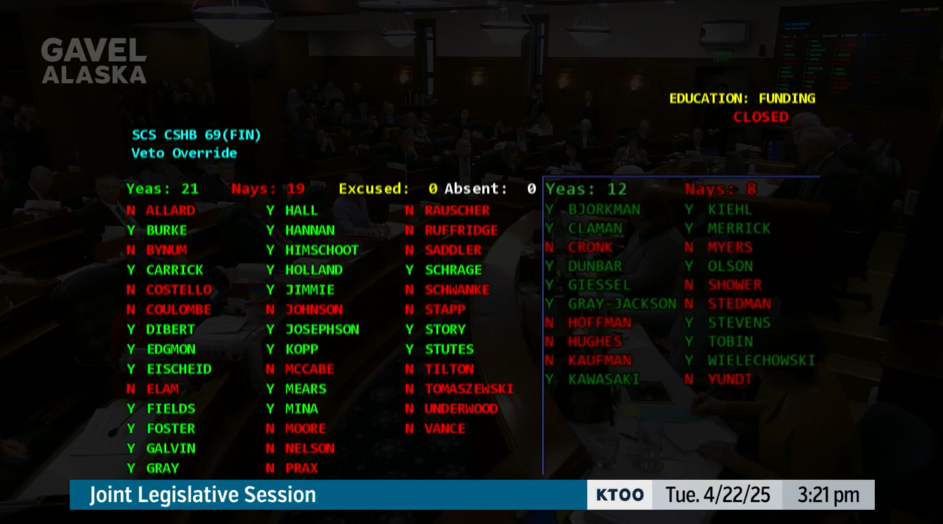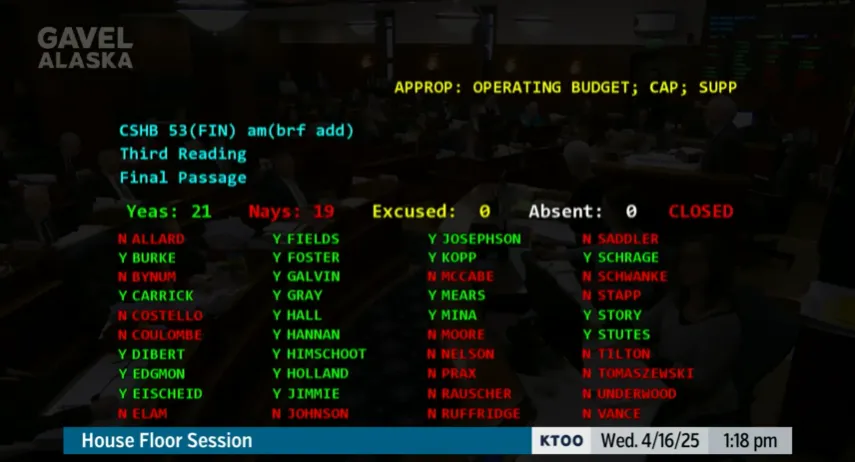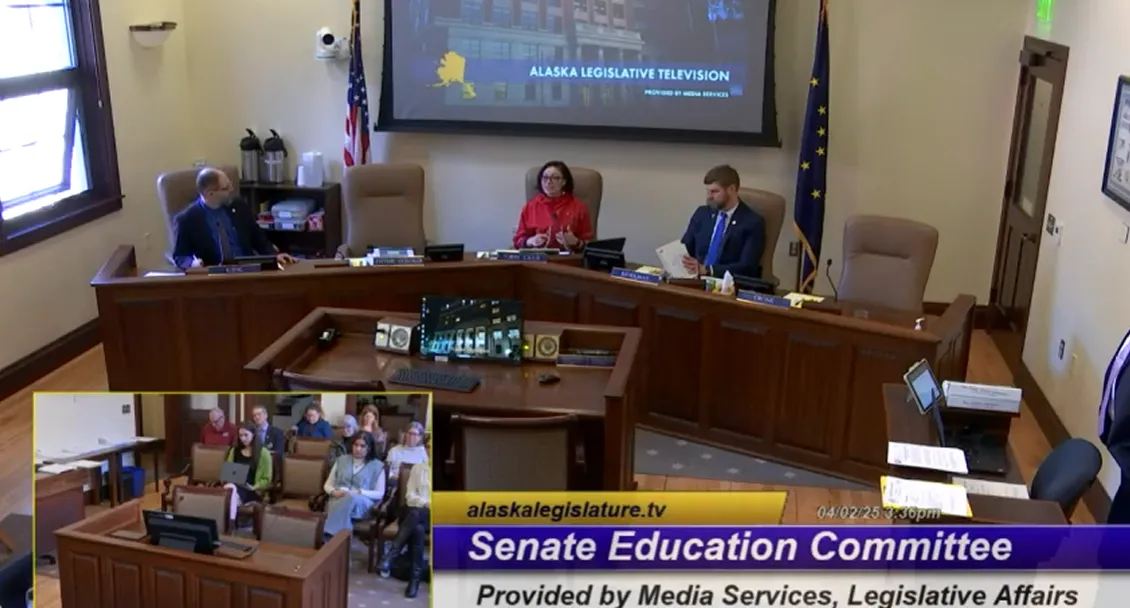33-27
A lot can change in a few months, and even more can change in a year.

It's Wednesday, Alaska. Day 93 of the legislative session.
In this edition: The Legislature, as expected, voted to uphold Republican Gov. Mike Dunleavy's second veto of a permanent increase to public school funding, this time on a 33-27 vote that lacked the intrigue and drama of last year's vote. While Dunleavy and his allies are pushing for an alternative that prioritizes funding for homeschool students and top-performing districts – while actually delivering a cut to most other students – the focus seems to have solidly shifted to the state's ever-worsening financial picture and the top-down refusal to actually do anything about it. The question now appears to be less about what schools need and more about what can fit in a budget that wasn't doing so hot before Trump took office. Which, according to an amendment this afternoon's Senate Finance hearing, is a $20 increase over the current year's per-student funding formula.
Current mood: 🥴
33-27

A lot can change in a few months, and even more can change in a year. Three months after legislators gaveled into the session with optimistic plans of delivering a much-needed financial lifeline for public schools and a year after the Legislature fell a single vote short of delivering a permanent increase to baseline K-12 funding by overriding the governor's veto of a school funding bill, legislators fell seven votes short of overriding his latest school funding veto on Tuesday.
The state's fast-eroding financial situation – which wasn't particularly great to start with – has taken hit after hit in the trade wars kicked off under President Trump, driving uncertainty and fear around the state's near-term financial future with collapsing oil prices and financial markets deep in the red. Meanwhile, Republican Gov. Mike Dunleavy and his legislative allies have remained firmly unwilling to budge on their demands to link any permanent funding increases to reforms that essentially boil down to increased funding for a less-than-accountable system public homeschool programs – which are increasingly pushing the boundaries of the Alaska Constitution's prohibition on using public funds to support private and religious education – and already top-performing schools.
Neither of those challenges seems to show any hint of change, so the 33-27 vote puts a button on any hope that the Legislature will approve a $1,000 increase to the Base Student Allocation, and likely dashes any hopes of a permanent increase while the political landscape is what it is.
If anything is surprising about the situation, it's that all but one Dunleavy-aligned Republican sat out the floor debate on the veto override altogether. There was no talk about grand policy reforms, about treating homeschool students fairly by increasing their funding or even perfunctory claims of caring about The Kids. Instead, the only Dunleavy-aligned Republican to speak in favor of the veto was North Pole Rep. Mike Prax, who suggested that people who want to spend more on public schools should simply write a check to the state.
The opposition to the override was left to Senate Finance Committee co-chairs Sens. Lyman Hoffman, D-Bethel, and Bert Stedman, R-Sitka. While they have been core members of the Senate’s moderate coalition majority, they broke from the caucus to argue that the state simply cannot afford to adequately fund school districts at this time. Hoffman conceded that schools probably need well north of a $1,000 BSA increase but that revenues must be addressed first, while Stedman said legislators should be content to make incremental progress on the BSA.
“We cannot balance the budget, and I think some of the rhetoric we’ve had for the last two months has been numbing people’s minds to how big the problem is,” Stedman said, noting that the governor had introduced a budget with a deficit north of a billion dollars. “It’s not a matter of what we want to do, it’s what we have to do.”
Their speeches, especially in the absence of Dunleavy-aligned voices on the floor, essentially served to refocus the entire debate around education funding around the budget and set the course for what's likely left in this legislative session.
What's (probably) next
On the floor, Stedman argued the Legislature should aim to maintain school funding, which would include the status quo BSA and the one-time boost of about $174 million that legislators approved after Dunleavy vetoed the last BSA bill. All together, it's about $77.5 million less than the $1,000 BSA would have provided.
But even that figure is far from certain.
Following his veto, Dunleavy introduced a bill with a $560 increase to the BSA. It also proposes additional funding for homeschool students and top-performing schools, which would bring the total amount of funding to a slight increase over the current year. That's why you'll hear some Dunleavy-aligned Republicans talk about a $700 BSA equivalent. But it's not and shouldn't be framed that way because not all the money will flow out to students through the BSA formula.
Unless directed to flow through the BSA formula, not all dollars are the same.
Because of the earmarked funds in Dunleavy's bill, homeschool students and those in top-performing schools are likely to see a funding increase above the claimed $700 BSA figure, while everyone else would actually see their funding cut under the governor's proposal. That, combined with other rigid policy demands, also makes that path a long shot.
Still, that $700 BSA figure seems to be something that Hoffman and Stedman have latched onto. During the Senate Finance Committee's afternoon hearing, the committee introduced a substitute to House Bill 57, the school cellphone policy bill (that suggests but doesn't require schools to ban them), that included a $700 increase to the BSA as well as a 10% increase to pupil transportation costs. That would amount to a roughly $20 increase over the current year's funding levels – which is the BSA and the one-time equivalent to the $680 BSA boost – but it would at least enshrine the whole amount in state law moving forward.
Does that actually have a chance of sticking? Who knows. Either way, the operating budget – which is currently in the hands of the Senate Finance Committee – will be what to watch.
Pitching policy

While it's taken a bit of a backseat now, it's also worth touching on the debate over the policy reforms that Dunleavy and his allies have demanded.
Along with the likely non-starter policies focused on boosting homeschools, top-performing schools and charters (something I've already written about at length), the governor's proposal also includes open enrollment provisions that could leave students unable to attend their nearest school if someone else beats them to registration and a broad expansion of charter school approvals that overrides local school board input.
Those demands, which still don't really even make a gesture at compromise, combined with the wet blanket of the state's budget picture and the dwindling days of session don't generate much optimism for a broader policy deal.
Moderate Kenai Republican Sen. Jesse Bjorkman, a former teacher who voted for the override, was pointed in his appraisal of the governor's policy demands during the floor debate on Tuesday, arguing it wouldn't deliver the accountability he and his allies claim is so important. He pointed out that many of the people calling most loudly for accountability measures for brick-and-mortar schools have also resisted testing when it’s applied to them. When the Senate Education Committee proposed assessments for homeschool students – about 14% currently participate in testing – the governor and his allies threw a fit.
“Someone might make kids take a test, heaven forbid,” he said. “Everybody loves, loves, loves accountability, right up until the time that it’s pretty important for their own kid to be accountable. Sometimes, that closely heartfelt desire for kids to be accountable goes out the window … At what point in time do we value education enough in this state to get the results that we expect?”
He said he’s worried that much of the lax oversight of the public school system, driven in part by the governor’s rallying cry for "school choice," has encouraged students and families to take the path of least resistance in education. A run of recent lawsuits has challenged programs for allowing students enrolled in private and religious schools to use state funding to pay for tuition and cover ritzy extracurriculars, such as horseback riding lessons.
Bjorkman said if they really wanted to explore issues of reform and accountability, they should start with assessments to make sure students have actually learned something with the public dollars they're using and work on meaningful efforts to curb chronic absenteeism in schools.
Hey, maybe that's why no one spoke up on Tuesday.
In the big picture

Districts will still make cuts, teaching positions will be eliminated, class sizes will continue to grow, and the shrinking list of in-school educational programs, activities and extracurriculars will continue to shrink. It's not clear, outside of a miracle, that anything will change on that front in the near future.
That said, the floor debate and the focus on the budget feed renewed calls for the state to finally enact some new revenue to balance the budget. The Senate has proposed several changes to the corporate tax laws, which are estimated to bring in several hundred million dollars if implemented, enough to pay for the increase to education. However, given Gov. Dunleavy’s steadfast refusal to entertain any revenue measures, it’s unlikely that any of those would escape a veto during his final two years in office. That'll likely blunt legislative enthusiasm for truly tackling the problem, meaning it'll all drag on while he's still in office.
The gridlock paints a gloomy picture ahead for the state, with many noting the need across the state was actually far greater than the $1,000 BSA increase that now seems out of reach. If the state's not willing to invest in itself or, at the very least, get its financial house in order, then why should anyone else?
“This bill is expensive, and it still isn’t enough,” said Rep. Nellie Jimmie, D-Toksook Bay, during the floor debate, noting that students in her district told her they just wanted someone to stick around. “It’s time to clearly say we need to raise new revenues. And we shouldn’t be scared of that, especially when we’re thinking of the future of our children and our children’s children.”
Still, any resolution will be too late for some, like the son of East Anchorage Democratic Rep. Donna Mears, who is graduating from high school this year.
"This bill, this funding, is coming too late for him," she said through tears, recalling attending rallies for a BSA increase that also never came when her son was in First Grade. "Our peak education funding came before he started school. Each child going through kindergarten this year is going to go into the first grade next year. Kindergarteners coming in next year are going to have larger class sizes; they will never have their kindergarten class be small."
Stay tuned.
Follow the thread: The joint session on the veto override
Additional coverage: The Alaska Current, Alaska Beacon, ADN, Alaska Public, KTUU
The Alaska Memo Newsletter
Join the newsletter to receive the latest updates in your inbox.




